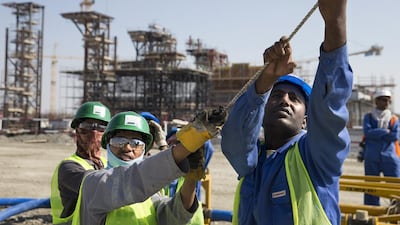The country’s workforce jumped 10 per cent to more than 4.4 million last year, the highest on record.
And one in every three people in work is employed in the construction industry according to new official figures.
The total number of workers rose to 4.417 million, the highest rate in 44 years, said Humaid Rashid bin Deemas Al Suwaidi, assistant under-secretary of labour affairs, in a statement carried by state news agency Wam.
About 1.212 million new work permits were issued last year and 821,000 terminated, he said.
The steep decline in the price of oil since last summer has fuelled fears that some companies may look at axing jobs.
The IMF on Tuesday cut its forecast for regional growth this year.
The fund expects the region to grow by 2.9 per cent this year, down from its earlier prediction of 3.3 per cent.
“Oil price declines will sharply slow growth for oil exporters,” said Olivier Blanchard, chief economist at the IMF. “There has been a transfer of income from oil exporting countries to oil importers. For the oil exporters it is clearly not very good news.”
But despite concerns about the pace of economic growth across the region, UAE recruiters say hiring levels remain buoyant.
The UAE’s online recruitment activity in March was up 17 per cent compared to a year-ago level, after remaining unchanged in February and declining 10 per cent in January, according to the Monster Employment Index released this month.
Banking, financial services and insurance industry was the top growth industry in March with 38 per cent year-on-year growth, followed by IT and telecom in second place, and healthcare in third place.
Among the sectors that recorded declines in hiring were manufacturing, consumer goods and oil and gas.
The construction sector was the biggest employer last year, with 1.5 million people working in the sector, contributing to 34 per cent of total employment. It was followed by the business sector with about 1 million workers or 24 per cent of total employment, and the industrial sector with 500,000 workers or 12 per cent of total employment.
The three sectors contributed a total of 70 per cent to employment last year in the private sector.
The health sector witnessed the highest rate of growth last year, expanding by 25.4 per cent, followed by the real estate, leasing and business services sectors with 18.6 per cent growth and hotels, restaurants, transportation and storage sectors with 12.3 per cent growth.
The figures also suggest that more people switched jobs last year.
Their number rose to 170,000 last year, a 62.4 per cent increase from 2011, the year of implementing a new transfer system.
The UAE had a population of 9.35m in 2013, according to the World Bank. The unemployment rate last year was projected at 3.67 per cent, compared with 3.79 per cent in 2013, according to the International Labor Organization.
A separate report released on Tuesday by the World Bank showed that the fall in oil prices did not negatively affect the amount of cash sent by workers to their home countries from the GCC last year. But it warned that the outlook was "uncertain", predicting that remittance flows from the GCC "could decline if the oil price were to remain low for a few years".
With reporting by Adam Bouyamourn
dalsaadi@thenational.ae
Follow The National's Business section on Twitter

